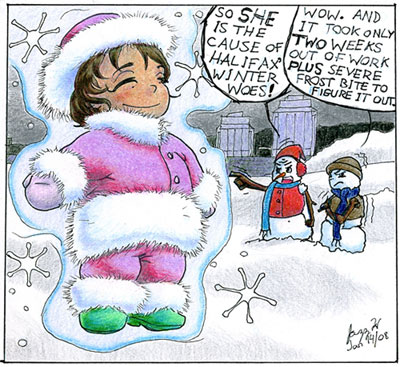 |
(Cartoon by Jasmine Wongus) |
Brace yourselves.
That was the message blared in headlines across the country. Newspapers announced this would be the coldest, snowiest winter Canada has seen in years, thanks to La Niña. It was unwelcome news for winter-weary Canadians, envisioning stormy traffic gridlocks and extra back-breaking hours of shoveling.
But Tom Duck of Dalhousie's Department of Physics and Atmospheric Science says there's more to the story. "If you look at the Environment Canada data, it actually suggests that La Niña will make the winter snowier and slighly warmer across much of Canada."
"From what we've seen so far in Nova Scotia, this winter doesn't look significantly colder than in past years," he says. For instance, he notes the average temperature in Nova Scotia in November is traditionally 4.5 C degrees. "This year, our actual temperature in November averaged 3 degrees Celsius, which is close to the temperature range you'd normally expect," he says, noting the date is not yet available for December.
La Niña and El Niño are naturally occurring phenomena that happen when the ocean's surface interacts with the atmosphere over the tropical Pacific. Changes in these surface temperatures affect tropical rainfall patterns and winds, which in turn impact weather patterns around the world.
While it is true that during the better-known El Niño, temperatures tend to be a bit warmer across the country, La Niña events can cause snowier and somewhat warmer conditions, relative to the average. Dr. Duck says this tends to happen in western and eastern regions of the country.
"In Nova Scotia, the climatalogy shows that there isn't much of an effect at all in either temperatures or snowfall. Any given year might be different but from historical data, we would conclude that La Niña likely won't have an effect on this year's weather in Nova Scotia," he says.
He adds there are many other factors that contribute to weather in any given season.
LINKS: in National Geographic | on BBC
